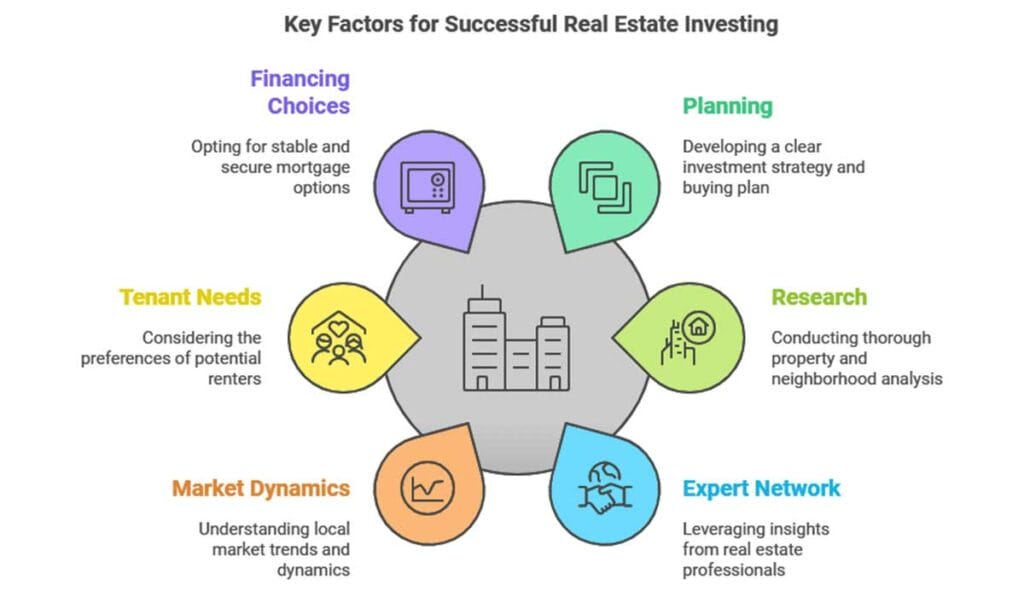
7 Costly Mistakes New Real Estate Investors Must Avoid to Succeed
Are you new to real estate investing?
It’s an exciting journey, but watching out for common real estate investing mistakes is important.
By avoiding these pitfalls, you can make smart choices, get a good return on your real estate investment, and reach your goals.

Key Takeaways:
- Have a clear plan before investing
- Do your research on properties and markets
- Build a team of experts to help you
- Understand all costs and calculate ROI carefully
Diversify your portfolio to manage risk
Avoiding Common Real Estate Investing Pitfalls
Real estate investing can be very rewarding, but it can be challenging. Even seasoned investors can make mistakes sometimes. For new investors to the world of real estate, it’s especially important to learn about the most common mistakes to avoid so you can steer clear of them.
Failing to Plan Your Investment Strategy
One of the biggest mistakes new real estate investors make is diving in without a clear plan. It’s exciting to get started, but you need to know your goals first. What do you want to achieve with your investments?
Defining Your Investment Goals
Could you take some time to think about your short-term and long-term objectives? Are you looking for a steady rental income? Do you want to fix and flip properties for quick profits? Or are you more interested in long-term appreciation?
Aligning Purchases with Long-Term Objectives
Once you know your goals, you can ensure that the properties you buy fit into your overall strategy. Don’t just jump at every opportunity—make sure each purchase moves you closer to your goal of being a successful real estate investor.
Inadequate Research and Due Diligence
Another common mistake is to do more research before buying a property, which can lead to poor investment decisions. It’s important to really understand what you’re getting into and make informed decisions.
Researching the Property and Neighborhood
Could you look closely at the specific property you’re considering? What condition is it in? Will it need a lot of repairs or upgrades? Also, could you research the surrounding area – is it a desirable neighborhood? Are property values rising or falling? One of the most common mistakes is buying a property in an area that is decreasing in value at the time.
Asking Critical Questions About the Property
Be bold and ask lots of questions about the property. How old is the roof? Have there been any recent renovations? When were the major systems last updated? The more you know, the better.
Understanding Local Market Dynamics
Real estate markets can vary widely from one area to another. Consider factors like population growth, job market, and development plans. Is the area thriving or declining? Understanding the local dynamics will help you spot good opportunities.
Neglecting Professional Guidance and Networking
Investing in real estate is a collaborative sport. Having the right team in your corner can make all the difference.
Building a Team of Experts (Agent, Inspector, Attorney)
You can go around with experienced professionals who can guide you. A knowledgeable real estate agent can help you find great deals. A thorough inspector will spot any issues with a property. And a sharp attorney will protect your interests.
Seeking Advice from Experienced Investors
Other investors can be a wealth of knowledge. You can look for local meetup groups or online forums where you can connect with people who have been in the game longer. Most are happy to share their insights and experiences.
Partnering Wisely: Defining Roles and Responsibilities
If you partner with other investors, could you define each person’s role and responsibilities upfront? That way, there will be clarity down the road.
Disregarding Tenant Needs and Quality
If you’re investing in rental properties, your tenants are your customers. Ignoring their needs and preferences is a recipe for high turnover and vacancies.
Identifying Your Target Tenant
Think about who your ideal tenant is for each property. Are you aiming for families, students, and young professionals? What features and amenities will appeal to them?
Meeting Tenant Expectations
Once you know your target tenant, could you make sure your property gets what they’re looking for? That could mean things like upgraded appliances, good lighting, or outdoor spaces. If you meet tenant expectations, they’re more likely to stay long-term.
Thorough Tenant Screening
Finding good tenants is key to being a successful landlord. Make sure to complete background and credit checks. Look for red flags like prior evictions or a history of late payments. Taking the time to screen tenants carefully will save you a lot of headaches.
Securing Suboptimal Financing
How you finance your investments can have a big impact on your returns. Many new investors make the mistake of taking whatever loan they can get.
Understanding Different Mortgage Options
There are many different types of mortgages out there, from conventional to FHA to hard money loans. Each has its own pros and cons. Could you do your research to understand which one best fits your needs?
Avoiding Risky Loan Products
Some loans may seem tempting because they let you buy with little money down. But they often come with higher interest rates or balloon payments down the road. You can stick with safer loan products, even if it means waiting until you have a bigger down payment.
Considering All-Cash Offers vs. Mortgages
In some cases, an all-cash offer can help you win a property in a competitive market. But it also ties up a lot of your capital. Run the numbers to see if a hard money loan might be the better choice for your overall investment strategy.
Overpaying for Properties and Underestimating Expenses
It’s easy to get caught up in the excitement of a deal and pay too much. However, overpaying cuts your profits and makes it harder to achieve a good ROI.
Determining Fair Market Value
Before you make an offer, could you look at recent sales of similar properties in the area? This will give you a good sense of what the property is really worth. Don’t just go by the seller’s asking price.
Calculating ROI Accurately
Could you make sure to factor in all the costs of buying and owning the property, not just the purchase price? That includes things like closing costs, repairs, ongoing maintenance, property management fees, and vacancies. Only then can you get an accurate picture of your potential returns?
Factoring in All Expenses (Maintenance, Repairs, Taxes, Insurance)
Many new investors need to pay more attention to how much it costs to own and maintain a property. As a general rule, budget about 1% of the property value each year for maintenance and repairs. And remember to account for property taxes and insurance premiums.
Property Age and Condition Considerations
Older properties can be appealing because they’re often cheaper. However, they may also have more repair and maintenance issues. Could you factor the property’s age and condition into your expense estimates?
Lack of an Exit Strategy and Market Cycle Awareness
Real estate investing isn’t just about buying properties – it’s also important to have a plan for when and how you’ll sell.
Defining Your Investment Timeline and Target Returns
Before you buy, think about how long you plan to hold the property. Is this a short-term flip or a long-term rental? What returns are you aiming for? Having clear targets will help guide your decisions.
Understanding Market Cycles and Trends
Real estate markets go through cycles, from booms to busts. Pay attention to where your local market is in the cycle. Are prices rising or falling? Is there a lot of new construction or tightening inventory? Spotting trends can help you time your investments.
Adapting to Changing Market Conditions
Markets can change quickly, so it’s important to stay nimble. If your original plan isn’t working, feel free to pivot. That might mean selling a property sooner than planned or shifting your strategy from flips to rentals.
Ignoring Tax Implications and Regulatory Compliance
Taxes and regulations are a big part of real estate investing. Ignoring them can lead to costly penalties and legal issues.
Consulting with Tax Experts
Real estate investments come with unique tax considerations. Things like depreciation, capital gains, and 1031 exchanges can greatly impact your bottom line. You can work with a tax professional specializing in real estate to ensure you’re taking advantage of all the deductions and strategies available.
Understanding depreciation and Tax Credits
Depreciation allows you to deduct a portion of your property’s value each year to account for wear and tear. This can be a powerful tax benefit. There may also be tax credits available for things like energy-efficient upgrades. Could you make sure you understand how these work?
Staying Updated on Local Regulations and Laws
Real estate regulations can vary widely from one area to another. Rules govern things like zoning, rent control, evictions, and property maintenance. Stay on top of the laws in your market to avoid any compliance issues.
Failing to Establish an Emergency Fund and Conduct Regular Inspections
No matter how well you plan, unexpected issues will come up. That’s why having an emergency fund and staying on top of maintenance is crucial.
Setting Aside Funds for Unexpected Expenses
Aim to keep at least 3-6 months’ worth of expenses in reserve. This will give you a cushion to cover sudden repairs or vacancies without derailing your investment.
Scheduling Regular Property Inspections
Be sure to check on your properties before something breaks. Schedule regular inspections to catch small issues before they turn into big problems. This proactive approach will save you money and stress in the long run.
Conclusion: Minimizing Risks and Maximizing Returns in Real Estate Investment
Real estate investing can be very lucrative but without risks. By avoiding these common mistakes, you can minimize risk and maximize potential returns. Remember to plan, research, work with experts, and stay flexible. With the right approach, real estate can be a powerful way to build long-term wealth.
FAQs
#1. What’s the most important thing for new real estate investors to remember?
The most important thing is to educate yourself and create a clear plan before diving in. Understand your goals, your market, and your financing options. Don’t let emotions or a fear of missing out push you into making rash decisions.
#2. How much money do I need to start investing in real estate?
It depends on your strategy and your market. You’ll typically need at least a 20% down payment for an investment property, plus closing costs and reserves. But options like house hacking, partnering, and hard money loans can help you get started with less.
#3. What’s the best way to find good investment properties?
Working with a knowledgeable real estate agent is a great start. They can help you identify properties that fit your criteria and navigate the buying process. You can also look for off-market deals by networking with other investors and property owners.
#4. How do I know if a property will make a good rental?
Look for properties in desirable areas with strong rental demand. Consider factors like proximity to schools, jobs, and amenities. Run the numbers to make sure the rent will cover your mortgage and expenses with some cash flow left over. And make sure to factor in costs like vacancies and repairs.
#5. What’s the best way to finance investment properties?
It depends on your situation. Conventional mortgages often have the best rates and terms but have strict qualification requirements. FHA loans allow for lower down payments but come with mortgage insurance. Portfolio loans from local banks can be more flexible but may have higher rates. Hard money loans are the way to go. You can close fast and refinance after you perform all the repairs.
